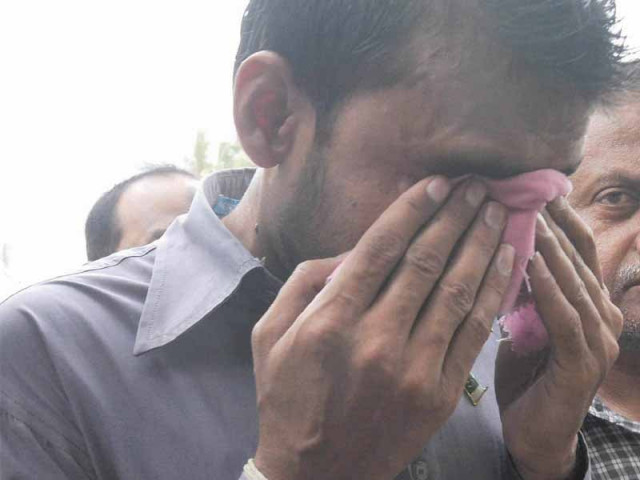Sarfraz Shah murder case: ‘I want to see him go to the gallows’
Sobbing brother Salik Shah lauds judicial activism; convicts to appeal sentence.

Salik Shah, who registered the murder case of his brother Sarfraz, burst into tears as soon as the judge announced his verdict, sentencing the Rangers’ Shahid Zafar to death and condemning the remaining six men to life in prison.
Shah, consoled by his fellow crime reporters and relatives, said later that he was satisfied with the judgment. The man who fired at my brother, killing him, was sentenced to death and those who left him to bleed to death were given life terms, he said. “They will be dealt with severely in the hereafter.”
The independent investigations, trial and conviction was precipitated by the suo motu action taken by the Supreme Court otherwise nothing could have happened as the police were out to protect the accused, Salik said when asked to comment about the police investigations.
“I want to see the man go to the gallows and the others to suffer,” he said. “They should not get away with this crime.” The men were convicted by Judge Bashir Ahmed Khoso of the Anti-Terrorism Court but can appeal the decision in the Sindh High Court in seven days.
After winning his first high profile case, a bureaucratically correct Special Public Prosecutor Muhammad Khan Buriro showered all praise on his boss, Prosecutor General (PG) Sindh Shahadat Awan. He said that at every step he was guided by the PG.
Giving a clean bill to the Rangers, the prosecutor was of the view that Sarfraz Shah’s killing was murder and an act of terrorism perpetrated by the men in their individual capacity. It will not become a stigma for the Pakistan Rangers, he hoped. In fact, the stigma and question about law enforcing agencies and Pakistani society will be removed after this verdict. The LEA men transgressed their authority and killed a unarmed man in broad daylight, he said.
A visibly upset defence lawyer, Niamat Ali Randhawa, who was representing the Rangers driver Manthar Ali and sepoy Muhammad Tariq, said the convicts would file an appeal as it was their right. “We hope that the accused [men] will be acquitted at the appellate stage,” he said. “The trial court was influenced by the order of the Supreme Court in the suo motu proceedings.”
Also quick to focus on the other side of the coin was defence lawyer Shaukat Hayat, who represented the main man standing trial, Shahid Zafar, who shot Sarfraz Shah. Hayat told The Express Tribune that the judgment suffered from legal infirmities. The charge was not framed under Section 302 of the Cr.P.C. but the sentence was given under that section, he pointed out, saying that the defence would question these elements in the appeal before the SHC.
The court framed the charges under specific provisions of Section 6 but none of the prosecution witnesses gave any evidence of planning, pre-design, use of force or threat to use force and the other ingredients of terrorism were missing.
The prosecution did not even bother to have the main accused man identified at trial as none of the witnesses pointed to him as the person who fired at Sarfraz Shah, said advocate Hayat. He maintained that legal lacunae left by the prosecution and infirmities in the judgment make strong ground for the appeals to succeed.
Published in The Express Tribune, August 13th, 2011.



















COMMENTS
Comments are moderated and generally will be posted if they are on-topic and not abusive.
For more information, please see our Comments FAQ